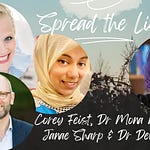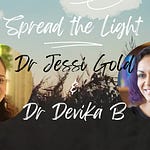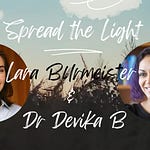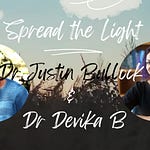Dear community,
Have you ever been in a teaching hospital, taken care of by a bleary-eyed resident — and wondered if they were alert enough to do the job? Have you ever been that bleary-eyed resident? I know I have.
From now until the end of September, we’ll dive into the norms of US medical training and the system overall that make health so hard to achieve for clinicians — along with possible solutions. As part of this series, we’ll hear from two current resident physicians about their health journeys during residency — starting today.
💫 Spread the light with Dr Devika B. First-person accounts of living with mental illness that dispel stigma and stereotypes and instead, spread hope and light — also a YouTube channel and podcast on Apple and Spotify
Because stigma festers in the dark and scatters in the light
Today’s conversation is a gem. It covers:
How Dr Goodman went from abject denial to mental illness recovery — to becoming a top mental health influencer
How he decided to share his mental illness journey with millions — while still in training
His take on medical training and mental health
Dr Goodman’s daily wellness strategies
Setting the record straight on *many* mental health myths
Dr Jake Goodman is a psychiatry resident physician and global mental health activist with more than 2.1 million followers on social media. He is a two-time TEDx Speaker, member of the University of Georgia Alumni Association's 40 under 40, and a participant in the Healthcare Leaders in Social Media Roundtable Series for the White House. Dr Jake uses his platform to fight stigma and discrimination, and to empower those experiencing mental health challenges to seek help. His advocacy work has been featured in Good Morning America, Men’s Health, Yahoo News, and more. In 2023, he was named 1 of 60 top influencers by Men’s Health.
Trigger warning: In this interview, we talk about depression, anxiety, suicide, and the abuses and toxicity that can occur in US medical training.
Above, you’ll find the audio recording of the podcast episode and below, a transcript. As always, the written conversation has been lightly edited for clarity and length. If you’d prefer to watch this conversation, click here.
Over the next few weeks, we’ll dive into the norms of US medical training and the system overall that make health so hard to achieve for clinicians — along with possible solutions. As part of this series, we’ll hear from current physicians about their health journeys, especially during training:
Psychiatrist Dr Ahmed Hankir’s journey with melancholia and elation in medicine
Psychiatry resident Dr Jake Goodman’s journey with depression and anxiety in medicine
Nephrology fellow Dr Justin Bullock’s journey with suicidality and depression in medicine
Emergency resident Dr Ade Osinubi’s journey with hopelessness in medicine
Click here to catch up on other Spread the light columns, in addition to other posts organized by column type, going back to our newsletter’s launch in January 2023.
If you or a loved one needs help for a mental health crisis, don’t hesitate to call or text 988 — or reach them online here. Find other resources here, search for a US treatment facility here, and find a US-based therapist here.
If you’re a US-based clinician or health student dealing with “any issue, not just a crisis” — reach out to the Physicians Support Line, free of cost and confidentially: 888-409-0141 (M-F, 8 am to 12 am ET).
Wishing you light,
Dr Devika Bhushan
I first came across Dr Jake's work when, in December of 2021, he posted this photo on social media with the words, “My name is Dr. Jake. I’m a physician who treats mental illness and I take medication for my mental health. And by the way, I’m proud of it.” In that post, he mentioned that as a doctor training to be a psychiatrist, most in his field would advise him not to post this.
“Some would view it as a risk for my career, but I didn’t join this field to continue the status quo,” wrote Dr Jake Goodman.
DB: Tell us about how your mental health journey began.
JG: I had a typical millennial kid’s introduction to mental health, which was pretty much nothing in elementary school [and] middle school. Just, like, a very poor understanding of what mental health is and how many people are affected.
So when I started to experience anxiety in college, I didn’t know what was going on. It’s one of those typical scenarios that you see in Medical Board exam questions: ‘Person goes to doctor to see why they’re having palpitations and difficulty sleeping. And all the tests are run and they're all negative — what’s the diagnosis?’
And I remember the doctor saying to me in college, ‘I think what you’re experiencing is anxiety.’ And I was in complete denial: ‘There’s absolutely no way I’m experiencing anxiety. I’m not somebody that struggles with mental health. That's not me.’
And I kind of over the next decade realized, ‘eh, he was probably right’ because I did experience bouts of anxiety throughout college and medical school.
But I never really sought treatment for my mental health until I was in residency, where I’m at today. Now I’m a third year resident doctor.
During my first year of residency, I was struggling really with depression, although I didn’t realize I was depressed at the time. It took a gentle nudge from a colleague and a friend to be like, ‘Hey, uh… you're depressed.’
You know, I was somebody that treated depression every single day, but it was hard to even recognize it myself.
I sought help at that time and that process of seeking help was totally life-changing. And today, I’m in a really amazing place with my mental health, and I’m so grateful that I did finally seek help.
DB: That's really striking how with both your experiences with anxiety as a college student and then later with depression in medical training, it was hard to recognize what was going on in yourself. Could you reflect a little bit on what it took for you to come to terms with the experiences that you were having as being mental health conditions?
JG: Sometimes it requires somebody else to really say something. You know, I thought I was burned out. And that’s a common thing we hear in medicine: ‘I'm just really burned out right now.’ And burnout can be a cover for depression, anxiety, so many different things.
I mean, burnout is totally real.
I’m not discounting burnout in the slightest, but I think we overuse the term burnout and we underuse the term depression.
And I was telling myself, you know, ‘Yeah, I’m not sleeping great. And my appetite’s not the best. I’m feeling kind of low energy.’ Even though these are symptoms of depression — ‘I’m not depressed. I don’t meet the full criteria,’ — you know, however you want to justify it.
What really started to wake me up is that I started experiencing anhedonia — essentially a fancy term for lack of joy or pleasure in things that you normally like doing.
And real, true anhedonia is you feel nothing. You know, like there’s something missing — playing soccer and feeling nothing. And that’s when I was like, ‘This might be a little bit more than burnout.’
I had a conversation with a friend around that time, and I was telling her I was feeling, and she said, ‘I think you might be depressed.’
And then it was just like, boom — fireworks in my head. Like all the synapses and neurons connected: ‘Oh yeah, I am depressed.’
Then I moved into stages of what do I do about it. Step one, I reached out to a therapist, and that was amazing. I had seen a therapist once or twice in college, when I was struggling with some things, but I never actually went to therapy more than one time. Therapy was amazing. And I still go to therapy, to this day.
And then I reached out to a psychiatrist and ultimately, was started on antidepressant. And the combination of medication and therapy did wonders for me.
DB: That’s amazing. What was your process like for wanting to go public and posting that really iconic photo that went viral?
JG: Yeah, I never realized it would go that viral. Truly.
So basically, you know, I was struggling. I reached out for help. And I started to feel better. And at this point, as I’m starting to feel better...
Keep in mind, I’d built a following of 1.2 to 1.5 million followers across all social media. People followed me for my education videos de-stigmatizing mental health, but at that point, I had really not at all talked about my own mental health, due to several things.
Number one, stigma. Number two, fear of what people would think of me. And number three, at that time I was a medical student. And being a medical student applying for residency, you feel like you’re under a magnifying glass and a spotlight, and I was afraid of ever talking about my mental health.
In fact, I had a disclaimer that I’d put at the end of every single post — something like, ‘This post does not reflect my own mental health. However, I will always use my platform to fight for mental health.’ And a lot of times, it did reflect my mental health, but I was putting that disclaimer on there to protect myself at the time.
Okay, fast forward: I’m in the process of feeling better, which is like the best feeling — going from depressed to starting to crawl out of depression — is like, a top 10 life experience. Just like putting on glasses and being like, ‘Oh, wow. I can absolutely see the world. It’s no longer black and white.’
When I was playing soccer when I was depressed, it was as if I had no peripheral vision. I could only see right in front of me. Truly; that’s how it felt. People would come up beside me, kick the ball right away. I was only seeing right here — right in front of me.
As I’m getting out of depression, all of a sudden I’m seeing all around me — truly I’m seeing, I’m more aware of my surroundings.
It was amazing and I wanted to share that with people who follow me, who are invested in my educational videos where I talk about and destigmatize mental health. And I basically had this conversation with myself like, ‘You know, obviously, this could be a risky post. People may view me differently; this might change things.’
At the time, I was probably the most followed resident doctor in the country. Maybe there were a few others. And I was like, ‘How powerful would it be if I put a photo up of me with a[n] antidepressant in my mouth and said that I take medication for my mental health and by the way, I'm proud of it? How many people could that potentially save — people that may have been on the fence about ever seeking help in the first place?’
And I hit post. I mean, I had it in my drafts for about a month while I really was in my head about it. And then one day, I just kind of had this clarity and I was like, ‘I’m going to do it.’
And I hit post and I went to sleep. And I woke up in the morning and it was viral.
I’ve received thousands of messages from people all over the world after that. After that, it was like a door opened and people flooded through. From, you know, the good, the bad, the ugly.
You can imagine, because I posted that on Twitter, too. Twitter is a particularly savage place at times. So you can imagine there were some people that hated me for seeing that. ‘How dare a doctor put a pill on his mouth and post about it? Pharma must be paying him.’ You know, I was getting like legitimate hate mail, but I hate to even bring that up because the reality is, that was 0.5% of it.
99.5% was very much like, ‘Thank you for doing this. My son, my daughter, my friend, my Mom is also experiencing mental health issues and this post makes them feel less alone.’ And particularly in the medical community, a lot of people reached out — medical students and residents and attendings. Because in medicine, there’s a huge stigma about doing what I did.
DB: That mirrors my own experience of coming out about bipolar disorder. It was, I would say, 98 to 99.5% positive — you know, floodgates opened, people sharing their own experiences. It is really so powerful to feel like that one story connects with thousands and millions of others and it’s such a beautiful thing to be able to connect on that really deep level with people you’ve never even met.
JG: 100%! Your post — I’ll always remember seeing it. I’ll always remember where I was when I saw it.
I had never seen anybody, any physician — especially a physician in the position that you were in — post about bipolar disorder. I was in the space — I was in the doctor mental health space. I had never seen it done.
And so once you did it, it was proof. It showed representation. You don’t know you can do something until you see somebody that is experiencing what you're experiencing do it.
And people saw that and they were like, ‘Wait a minute. If she could do it, I could do it. I could become a physician. I could become the Surgeon General of California. I could do anything with bipolar disorder.’ All the props to you, that was one of the coolest things I've ever seen on social.
DB: Thanks, Jake, I really appreciate that. We're kindred spirits — trying to do this stigma reduction work — together.
Let’s turn to the subject of your TEDx talk, which was extremely powerful, on fixing a broken medical system — and specifically, the training part of that medical system. Meta-analyses show that one in three to one in four medical students will have clinical symptoms consistent with depression. And only one in six of them will actually end up seeking formal treatment.
In your talk, you use these very powerful and evocative phrases: ‘We are generating more sufferers of mental illness than we are healers.’ You say that training is actually an ‘occupational hazard,’ which is both unethical and unsafe. And you talk about the different layers of toxicity that exist. Where do you think we need to go?
JG: The way the system is set up is that today — we're talking in August 2023 — it is completely legal and accepted for resident doctors to work up to 28 hours in a shift. 28 hours!
Research shows that if you've been awake for 24 hours or more, you have physiological changes in your body that actually mimic the effects of alcohol intoxication: decreased reaction time, decreased ability to focus. And if you’re awake for more than 24 hours, it’s about the equivalent of having a blood alcohol content of 0.1, which is above the legal limit to drive (0.08, in most states).
So we are essentially asking resident doctors to operate on or treat a person when their physiological reactions are such that they wouldn’t be able to legally operate a vehicle because of their level of — essentially — intoxication.
When you’ve been awake for that long — your brain, your body — you can’t be at your best, not even close to your best. You could imagine the effects that’d have on people's mental health. And also the effects it has on patient care, quite frankly.
According to the ACGME — they do the accreditation process [for training programs] — those are currently the rules. It’s still completely legal, completely accepted to do 24-, 25-, 28-hour shifts.
Find another career in which human lives are at risk that allows that.
Imagine you were about to get on a flight to Hawaii and the [pilot] turned to you and said, ‘I haven't slept in 23 hours.’
Would you get on that flight? I mean, no way.
Then there’s a culture that exists within medicine, where it can be toxic. You know, medicine is a very much a hierarchy: medical student, fourth year medical student: sub-I, intern — which is first-year resident, junior resident, senior resident, chief resident, fellow, attending.
Even after that, there's more layers. And there’s a culture of hazing, of disrespect.
If you come into to medical training with a predisposition for a mental health condition — odds are medical training is going to make it come to the surface.
DB: It’s gonna pull it right out of you.
JG: Totally. And if you don’t come in with a predisposition to a mental health condition, you still probably could end up getting a mental health condition, through just the brute hours and the toxic culture.
About one in four medical students will experience depression throughout their training. And one in nine trainees will experience suicidal ideation in their training — or thoughts of ending their lives. Incredibly scary numbers.
You just can’t imagine any other context in which this could be legal. I can’t imagine that this will continue.
Truthfully, I thought we would see changes by now. Real objective changes. I’m not talking about wellness modules — I’m talking about real objective changes. But we really don’t have those yet.
To the listeners, if you’re interested in the history, look up Libby Zion: essentially, a young woman died in the New York Emergency room [in 1984], in large part due to a medical error that was made by an overworked resident physician.
And that essentially established the work hour restrictions of 80 hours a week that we have today. You know, unfortunately, I think it will take someone getting seriously hurt or killed in order for things to change, whether that's a patient or that's a resident.
If we still have 28 hour shifts in 10 years in medical training, something’s very, very much wrong.
DB: [Amen!] How has stigma affected you in your journey?
JG: At first, stigma prevented me from seeking help. It would’ve been really nice to reach out to a therapist when I was in college going through it.
I think part of it is being a guy. You know, in men’s culture — although it’s gotten so much better — there’s totally a stigma against men, you know, going to a therapist or a psychiatrist, talking about their mental health in general.
I can’t really recall any conversations about mental health that I had with my guy friends in high school or college.
And even when I realized like, ‘yeah, this is probably anxiety,’ the thought never even really crossed my mind — I should go get this looked at. I should go talk to somebody whose job it is to help people who are struggling with this.
Because the stigma just prevented me from even going there.
And as I saw some of the worst case scenarios that can occur with mental illness. I had a friend that passed away from suicide when I was in college.
That really just was like smashing a hammer and glass. It was a total wake-up call that this is the kind of stuff that can happen. It’s not just like, the person gets really sad and isolates for a little while — people are dying out here at alarming, alarming rates.
And it took some things like that for me to realize this is worth talking about, not just for myself, but for other people.
I’m on this side of the spectrum now: let’s talk about everything, because you almost have to push the boundaries and the barriers in order to get the culture shifted.
I hope I’ve pushed the culture like a millimeter in the direction of, ‘Let's just talk about how we feel and let’s not be afraid to go seek help.’ I’d like to think that I’ve had a very small effect on the shift in the culture — at least in the medical field, but hopefully in the general public, and especially, I think, in male culture and mental health.
DB: Just to underline one really important set of points around male mental health: we have to, even when kids are growing up, normalize full access to the entire emotional range for boys and girls and folks who are gender-diverse.
Because as you know, boys and men are diagnosed with depression, for example, at half the rate that girls and women are, and part of that is that they are socialized to have access to this very restricted emotional range. Their symptoms of depression more often show up as irritability or anger, rather than sadness.
The model that we have, the DSM-V list of criteria for major depression, often is misaligned with the way in which men express depressive symptoms and men are dying by suicide at 4x the rate that women are. And there’s a lot wrapped up into that, but certainly one aspect is opening up this full emotional range and allowing for men to feel entitled to all emotions.
JG: I couldn’t agree more. And I think that the younger culture is really moving in that direction, not just for men, but in general.
My two-year-old niece will say, ‘I am angry.’ I didn't even know what that really meant until I was like older, until I could recognize my emotions.
With movies like Inside Out and with celebrities like Selena Gomez and Michael Phelps — I can go on and on with people talking about it now.
Talking to my niece who is now about to be in middle school — going to therapy is like, cool, in their generation. Can you imagine how amazing that is?
DB: That really, truly is amazing. It’s funny, I'm thinking about my own two-year-old, Rumi. Recently, we went nomadic as a family and he’s had all kinds of new emotions: ‘I'm scared; I’m happy; I'm sad.’ He has all of these big feelings and it’s really remarkable and wonderful for him to be able to talk to us about them.
This next question is a fun one: What’s a mental health myth that you’d like to bust for us?
JG: What immediately comes to mind is that stimulants for people with ADHD are addictive and shouldn’t be used. Stimulants are so stigmatized and the reality is, studies have consistently shown that stimulant medication, for someone that is old enough, can be incredible at relieving the symptoms of ADHD.
And then I’d say, myth number two is: what you’re going through — nobody else can understand or nobody else has experienced — [that] no one else is feeling like this.
And the reality is so many people struggle in so many different ways. You know, [depression is very common], but people with depression feel isolated. Like you can’t sleep — staying up all night, staring at the ceiling wondering why you’re having ruminating thoughts. You’re not the only one going through it, and it can feel like that.
That’s some of the symptoms of mental health: feeling isolated, feeling like you’re the only one that's going through it, but it’s not true.
And there are people that have felt just the way that you feel. And that’s the beauty of social media — you find out that someone else is going through the same thing you're going through.
Wait a minute, somebody else is staying awake at night and staring at the ceiling and unable to get their thoughts out of their mind — and it makes you feel less alone. And when you feel less alone, you feel like, ‘Well, they're having it and maybe they’re getting better. I can get better, too.’
DB: I love both of those. As a pediatrician, I've seen that magic that the right ADHD medication, with the right titration and oversight — what that can do to a young kid and family and really turn around their trajectory. And the second one, I think that's just so beautifully put because that is the pernicious, insidious, treacherous part of having a mental illness: it makes you feel like you're an N of one and no one could possibly love you if they truly knew what you were going through or how you were feeling, or much, much less understand your experience.
And that’s really where it becomes so powerful to know that you’re in a tribe of millions of other humans who have been successfully treated in the same exact boat.
JG: Totally. Every mental health condition has a treatment. I’m not aware of any mental health condition that we just say, ‘No — good luck. You know, we can’t really help you.’ Of course, there’s ones that are more difficult to treat than others, without a doubt. But there is a treatment option out there that can help you feel better in whatever you are going through in the mental health world.
Mental health is also moving at a rapid rate, and newer and newer treatments are coming out that are amazing. I’m studying TMS right now for depression and other mental health conditions. We're looking at psilocybin for PTSD; we're looking at ketamine.
The future is so bright and whatever you’re going through right now, if you haven’t found the right treatment, there’s something out there that’s going to help you out.
DB: Thinking about what it takes, especially as a resident, to stay well day-to-day — what are your top strategies for managing your anxiety and depression as you go through your life?
JG: There’s a concept that’s taught by a [therapist] named Dr. Stutz — they did a documentary on him on Netflix.
It's called [the] Life Forces [Pyramid]. And I actually like to teach this to patients because it’s really cool. At the bottom of the triangle is your relationship to your body. And that’s what I want to focus on here.
There are really three things that are my non-negotiables:
Number one is sleep — consistent, quality sleep. That’s seven to nine hours — and it's different for everybody. Consistent, quality sleep over a long period of time is one of the best preventative treatments that we have to keep yourself in the best mental state. I believe it’s up there with some of the best mental health treatments we have.
And I know it’s not easy, especially if part of the symptoms you’re experiencing are insomnia, difficulty sleeping. But if you can get seven to nine hours of sleep consistently — going to sleep around the same time, waking up around the same time — that is huge for your mental health.
In that same bottom row is nutrition. I’m pretty good about eating good food, but also making sure I'm eating at consistent times and making sure I’m eating a breakfast, a lunch, and a dinner.
And that those options are high in stuff that keeps me going. I don't need a hamburger at three different meals. I’m really able to eat a balanced, fruit-veggies diet. My wife is a healer, [a] chef. She makes incredible meals and I’ve been helping out, too.
So, solid sleep, solid food, and then — exercise. Recently, a study came out about the effects of burst exercises and reduction in cancer risk. Two to three minutes of burst exercise — high-intensity — like two to three minutes of running up the stairs at work.
So: exercising. And that doesn’t need to be a 60-minute workout everyday for me. I play soccer twice a week. I get on the Peloton for 15 minutes a day if I can. Sometimes I do yoga for eight minutes — whatever it is.
So for me, those make the base of the pyramid and that’s what I make sure [are] my non-negotiables every day. And like I said, even if it’s a few minutes of exercise, I check that box and that keeps me stable.
DB: That’s awesome. How do you see your journey as having molded your unique superpowers?
JG: I think I’ve really embraced vulnerability, which would've shocked me when I was in high school — because I was definitely not a vulnerable person, nor was I in college.
At this point, the book’s almost cliched to mention because it’s become such a household name, but The Power of Vulnerability by Brené Brown — I read that book in college. And that really changed the way that I viewed vulnerability.
I used to view vulnerability as a weakness, and now I view it as one of the biggest strengths you could possibly have. When you are vulnerable, you empower other people, you empower yourself. It’s one of the strongest things you can do in life is to be vulnerable with yourself and vulnerable with your patients, vulnerable with your loved ones — with anybody in your life.
And I’ve embraced vulnerability on social media big time. I ended up having a melanoma scare two years ago. That's where that little scar is from. And I just talked openly about the experience of finding out I had skin cancer at 29 years old. And that allowed other people to look into their own derm conditions and started going to the dermatologist and get skin checks.
Just being vulnerable and telling people what’s actually going on has been one of the grounding principles that I’ve lived by over the last five years or so. And I see myself continuing to do that. I plan to always be vulnerable because I view that as one of the biggest strengths that I have.
DB: What a true gift for you to have found that strength and to tap into it in the ways that you do today. So, one final question: What are your hopes as you look forward for yourself, but also for us collectively, in the future?
JG: I would like to just see a world where talking about mental health is no big deal.
I would like to see a world where if I would put that post up about a pill in my mouth, people are like, ‘Okay, who cares?’ Like that would’ve been the best. You know? And maybe that’s 40 years out.
Imagine that I had a pill for high blood pressure in my mouth and I said, ‘I am Dr. Jake and I take medication for high blood pressure.’ People would be like, ‘All right, cool. Like, so does everybody; it’s not a big deal.’
That’s where I hope the world goes — talking about mental health is no big deal at all.
It’s totally normalized, just like high blood pressure, diabetes, cancer, and a million other things out there. In medicine, it’s just normal. And going to a therapist is no different than going to your primary care doctor. Going to a psychiatrist isn’t a big deal. It’s something that anybody has access to.
It’s affordable and it’s normalized and it’s almost cool to go out, reach out, feel better about yourself, and improve your mental health.
















Spread the light: Dr Jake Goodman's journey with anxiety and depression in medicine